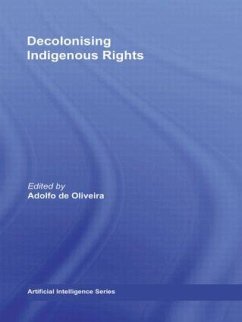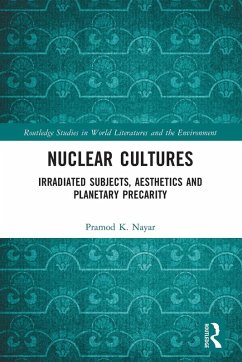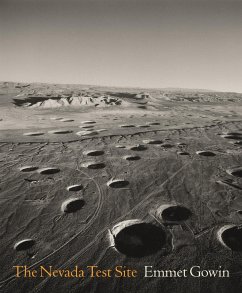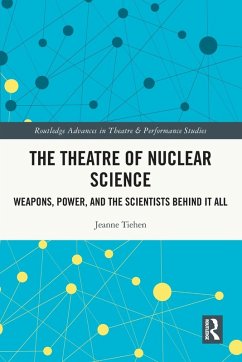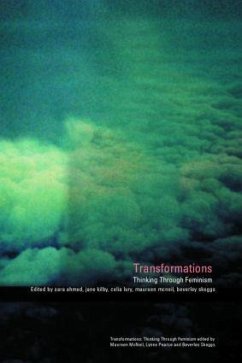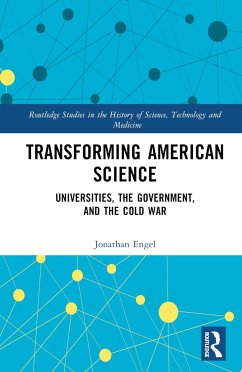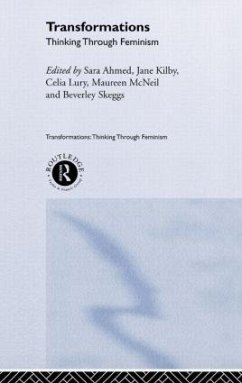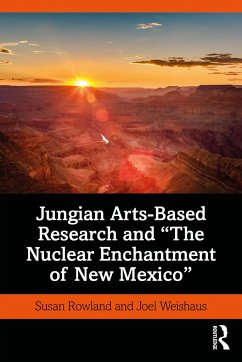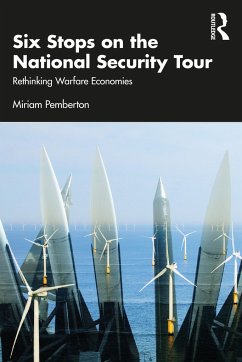Valerie L. Kuletz
Broschiertes Buch
The Tainted Desert
Environmental and Social Ruin in the American West
Versandkostenfrei!
Versandfertig in 6-10 Tagen
Weitere Ausgaben:

PAYBACK Punkte
25 °P sammeln!





For decades, nuclear testing in America's southwest was shrouded in secrecy, with images gradually made public of mushroom clouds blooming over the desert. Now, another nuclear crisis looms over this region: the storage of tens of thousands of tons of nuclear waste. Tainted Desert maps the nuclear landscapes of the US inter-desert southwest, a land sacrificed to the Cold-War arms race and nuclear energy policy.
Valerie L. Kuletz, the daughter of a weapons scientist, grew up near a Department of Defense research and testing center in the Mojave Desert. She has taught at the University of California at Santa Cruz, and currently is Lecturer in American Studies at the University of Canterbury in New Zealand. Her work on this book won the American Sociological Association's 1997 Robert Boguslaw Award for Technology and Humanism.
Produktdetails
- Verlag: Routledge / Taylor & Francis
- 1998.
- Seitenzahl: 362
- Erscheinungstermin: 3. April 1998
- Englisch
- Abmessung: 229mm x 152mm x 20mm
- Gewicht: 535g
- ISBN-13: 9780415917711
- ISBN-10: 0415917719
- Artikelnr.: 21995023
Herstellerkennzeichnung
Libri GmbH
Europaallee 1
36244 Bad Hersfeld
gpsr@libri.de
"This is an important and serious book that deserves a wide audience, both in and out of the classroom." -- International Journal of Mass Emergencies and Disasters
"...present detailed understandings of the environmental and social impacts of advanced industrial society on diverse American Indian communities...they make important contributions to understanding the broader differential benefits and burdens of science and technology in the late twentieth century, particularly as it concerns environmental degradiation...will be of particular interest to students of the American West, American Indian communities, and scholars of environmental justice and of societal change in the postindustrial world." -- Environmental
"...present detailed understandings of the environmental and social impacts of advanced industrial society on diverse American Indian communities...they make important contributions to understanding the broader differential benefits and burdens of science and technology in the late twentieth century, particularly as it concerns environmental degradiation...will be of particular interest to students of the American West, American Indian communities, and scholars of environmental justice and of societal change in the postindustrial world." -- Environmental
Mehr anzeigen
History
"The author's inclusion of Native-American perspectives and voices, her critique of the "objectivity" of science, and the timeliness of the topic...all make this one of the most important environmental books of our time." -- The Bloomsbury Review
"The Tainted Desert brings to mind Rachel Carson's Silent Spring as a wake-up call to Americans." -- The Bloomsbury Review
"Tainted Desert is a powerful, important, and readable explication of the nuclear devastation of the American Southwest." -- San Francisco Bay Guardian
"[Kuletz] has written a striking...portrait of the consequences of `nuclearism' in the American West, and particularly of the tragic, largely unacknowledged overlap between the domain of Native Americans and that of uranium mining, weapons testing, and nuclear waste storage... Her study invokes the richness of a landscape that has been overlaid with devestation... This is an important and, at times, eloquent book." -- Audubon
"...a moving account of the 'secret nuclear holocaust' spawned in the Southwest desert by the nuclear experimentation of the 1940s, '50s and '60s...readers will find a deeply disturbing indictment of our government's neglect and lack of responsibility to the land and its people." -- Publishers Weekly
"Offering a unique perspective on a controversial topic, this is recommended for academic environmental and sociological collections." -- Library Journal
"Kuletz does a solid job of presenting [Native American] views..." -- Kirkus Reviews
"The Tainted Desert is a powerful, important, and readable explication of the nuclear devastation of the American Southwest... In her very fine text, Valerie Kuletz explores the ways in which the deadly convergence of militarism, science, and the nuclear industry resulted in environmental havoc that threatens both the indigenous peoples of the region and the rest of us who live on the planet... She makes compelling arguments without resorting to jargon... will change the way you look at the world." -- San Francisco Bay Guardian
"The Tainted Desert vividly shows how contending constructions of nature map the earth and how these constructions--scientific, policy, Native American, tourist, sacred, and secular--collide in the management of nuclear waste. This is an important book and a deeply satisfying read." -- Donna J. Haraway, author of Modest_Witness@Second_Millennium
"Valerie Kuletz presents an astonishingly powerful indictment of the interrelated processes of genocide and ecocide that the US nuclear establishment has visited upon the western regions of our continent since 1945. Thoroughly documented and eloquently argued, this book offers one of the best overviews of America's self-imposed radioactive holocaust. It is absolutely essential reading for anyone in the least concerned with the future of the land, or of life itself." -- Ward Churchill, Coordinator of American Indian Studies, University of Colorado
"Through the powerful tools of visual and narrative mapping, Kuletz makes visible the human cost of nuclear development and testing and raises the lid on the pressing issue of waste storage. ... [A] comprehensive work that demonstrates clearly how science, once thought to be objective, arises from a cultural viewpoint." -- Booklist
"... a thorough analysis of intercultural differences." -- Choice
"A disturbing look at how the federal government has carved up the American West into gunnery ranges, army bases, testing grounds, and nuclear waste dumps, and destroyed the environment and Native American culture in the name of 'defense'." -- Sunday Record, Hackensack, N.J.
"The author's inclusion of Native-American perspectives and voices, her critique of the "objectivity" of science, and the timeliness of the topic...all make this one of the most important environmental books of our time." -- The Bloomsbury Review
"The Tainted Desert brings to mind Rachel Carson's Silent Spring as a wake-up call to Americans." -- The Bloomsbury Review
"Tainted Desert is a powerful, important, and readable explication of the nuclear devastation of the American Southwest." -- San Francisco Bay Guardian
"[Kuletz] has written a striking...portrait of the consequences of `nuclearism' in the American West, and particularly of the tragic, largely unacknowledged overlap between the domain of Native Americans and that of uranium mining, weapons testing, and nuclear waste storage... Her study invokes the richness of a landscape that has been overlaid with devestation... This is an important and, at times, eloquent book." -- Audubon
"...a moving account of the 'secret nuclear holocaust' spawned in the Southwest desert by the nuclear experimentation of the 1940s, '50s and '60s...readers will find a deeply disturbing indictment of our government's neglect and lack of responsibility to the land and its people." -- Publishers Weekly
"Offering a unique perspective on a controversial topic, this is recommended for academic environmental and sociological collections." -- Library Journal
"Kuletz does a solid job of presenting [Native American] views..." -- Kirkus Reviews
"The Tainted Desert is a powerful, important, and readable explication of the nuclear devastation of the American Southwest... In her very fine text, Valerie Kuletz explores the ways in which the deadly convergence of militarism, science, and the nuclear industry resulted in environmental havoc that threatens both the indigenous peoples of the region and the rest of us who live on the planet... She makes compelling arguments without resorting to jargon... will change the way you look at the world." -- San Francisco Bay Guardian
"The Tainted Desert vividly shows how contending constructions of nature map the earth and how these constructions--scientific, policy, Native American, tourist, sacred, and secular--collide in the management of nuclear waste. This is an important book and a deeply satisfying read." -- Donna J. Haraway, author of Modest_Witness@Second_Millennium
"Valerie Kuletz presents an astonishingly powerful indictment of the interrelated processes of genocide and ecocide that the US nuclear establishment has visited upon the western regions of our continent since 1945. Thoroughly documented and eloquently argued, this book offers one of the best overviews of America's self-imposed radioactive holocaust. It is absolutely essential reading for anyone in the least concerned with the future of the land, or of life itself." -- Ward Churchill, Coordinator of American Indian Studies, University of Colorado
"Through the powerful tools of visual and narrative mapping, Kuletz makes visible the human cost of nuclear development and testing and raises the lid on the pressing issue of waste storage. ... [A] comprehensive work that demonstrates clearly how science, once thought to be objective, arises from a cultural viewpoint." -- Booklist
"... a thorough analysis of intercultural differences." -- Choice
"A disturbing look at how the federal government has carved up the American West into gunnery ranges, army bases, testing grounds, and nuclear waste dumps, and destroyed the environment and Native American culture in the name of 'defense'." -- Sunday Record, Hackensack, N.J.
Schließen
Für dieses Produkt wurde noch keine Bewertung abgegeben. Wir würden uns sehr freuen, wenn du die erste Bewertung schreibst!
Eine Bewertung schreiben
Eine Bewertung schreiben
Andere Kunden interessierten sich für






